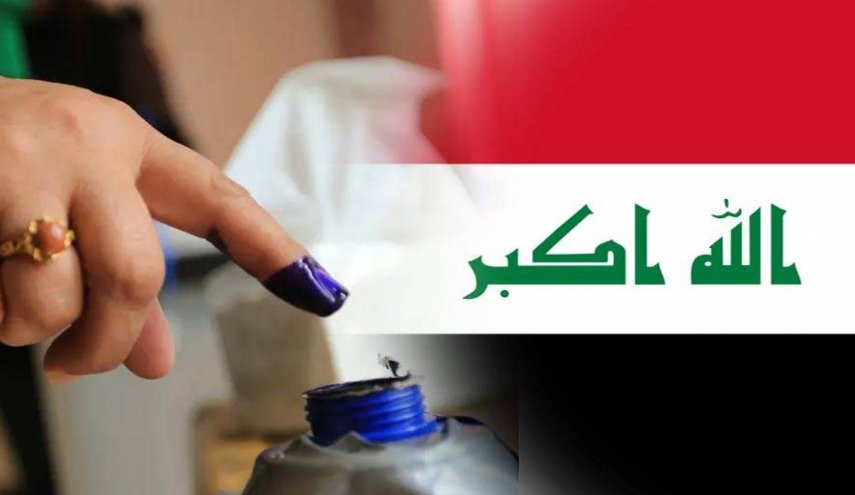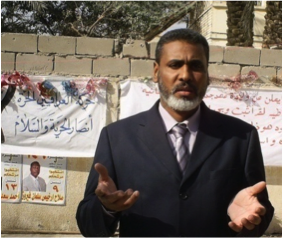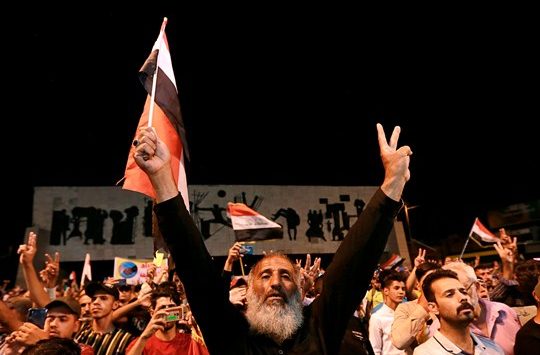The Iraqi Civil Society is on the Verge of an Important Election, with the Potential to Change the Iraqi Political Landscape
Previous elections in 2018 were stained by corruption and fraud. The civil society with the support of local and international organisations is committed to ensure these acts are not repeated again.
In October 2019, protestors flocked onto the streets, demanding change. The key motivation driving the Iraqi youth to march in the streets across the country was the insistence for early elections.
The Iraqi economic and political crisis led to the 2019 uprising.
Young citizens started a first wave of demonstrations early in October 2019. They showed their grievances towards the general political system that has failed to meet their expectation: corruption, high rate of unemployment, poverty, lack of security and poor public services.
Other causes for the civil unrest included the demand of justice, equality, meritocracy, the end of sectarism and a drastic reform of the political class.
What did the citizens receive in return? The response from the government was violent suppression, unlawful use of force, widespread killings and abductions. Yet there was no concrete action taken in terms of political reforms.
Al-Kadhimi was appointed as his successor.
During the following year, the demonstrators again took to the streets with better organization and coordination, lobbying for more specific requests: early elections, new electoral law, a reform of the political system and economic reforms.
Official sources report more than 600 people have been killed and at least 20,000 injured over the course of the protests.
Due to the efforts of the demonstrators, early elections have been called: Initially planned for the 6th of June 2021, the elections have been postponed until October the 10th.
The key major factors that have a crucial role in the upcoming election are:
- The new electoral law
- The Electoral Commission
- The Federal Court
1 The Electoral Law
As a result of the protests, a new electoral law was ratified. The new law however was met with divided public opinion. During interviews of frontline protestors conducted by our partners, it emerged that the new law does not meet their expectations. Concerns were highlighted regarding how the multiple constituencies law was not reflecting the requests of the protestors but instead the political parties’ agenda.
In particular, the tribe and sect based political parties have an increased chance of gaining a higher share of votes due to how individuals are elected within the district.
The law establishes multiple constituencies with 83 electoral districts. This will allow a single candidate to be elected per district rather than a coalition.
Since regional areas are typically controlled by tribes, it is likely that the result of the election will be a reflection of the tribe’s vision rather than the will of the people.
Under the control of the tribes, there may be a further increase in confessionalism in direct opposition of the demands for secularism by the protestors.
The law will also affect the fair participation of women candidates, limiting them to one seat in each district.
The initial draft release of the new law had stipulated the minimum age for standing as a candidate at 25. The age however was raised to 28 in the final draft which was ratified into law. This shows the unwillingness of parliament to allow for a younger generation of leaders to emerge. In reflection, the October uprisings were largely led by the youth who were representing the majority of the population.
As a result of these concerns and the lack of trust in the electoral process, there is a risk that disgruntled citizens will boycott the election.
2 The Independent High Electoral Commision
The Independent High Electoral Commission (IHEC) is an independent body with responsibilities to oversee the electoral process.
In 2019, Parliament restructured the IHEC, requiring all 7 board members to be Judges appointed by a draw. This was to appease the demands of the protestors to increase transparency.
The role of the IHEC is to “promulgate rules and adopted principles for federal, regional and local elections and referenda throughout Iraq, to ensure their implementation in a just and transparent manner.”
The key responsibilities of the Commission include:
“• Establishing and updating the voter registry;
• Regulating registration and certification of parties for elections;
• Regulating and certifying candidate lists for elections;
• Accrediting elections observers, party and media agents;
• Certifying tally procedures;
• Setting regulations and instructions to ensure a fair electoral process;”
There are legal and logistical measures needed to perform these tasks which require extensive time and resources. Due to the limited notice provided by the Government, The Commission was not sufficiently prepared to perform its duties which led it to successfully request to postpone the election date from the 6th of June to the 10th of October 2021.
There is distress within the civil society surrounding how much the IHEC are listening to their concerns.
3 – The Federal Court of Iraq
The Federal court of Iraq is expected to be ready to certify the results of the election. The Federal Court will utilise the election law to support all the necessary measures required to make the electoral process effective. This means preventing fraud and manipulation, ensuring a safe environment before and during the elections, inviting international observers and conducting the relevant training to the staff in charge of the automated voter registration system.
Organizations supporting the civil society
The Iraqi civil society has been integral in demanding and actioning the necessary changes needed in the political system.
The civil society plays a key role in ensuring fair and just elections. Empowering the citizens, numerous local and international organizations as well as activists and volunteers are starting an important process of observing the upcoming elections both in the phases before, during and after the election day.
Before the elections ICSSI would like to present initiatives with the goal to facilitate Iraqi civil society projects aimed at observing the progress of the election’s preparation phase.
A primary goal of the concerned Iraqi civil society is to ensure that there is transparency in all the phases of the elections process and hold the commission accountable for their activities.
In order to achieve this aim, ICSSI will support its partners looking to inspect the polling stations including the technology being used to verify they have not been tampered and to ensure the staff have been appropriately trained to utilize the devices.
A secondary goal is to lobby the Commission to make the voter data freely available for independent audit.
Another core point in regard to transparency is to campaign for the release of financial records pertaining to funds allocated by political parties for the electoral campaign.
Clarity is required with regards to the laws applied: together with its Iraqi partners, ICSSI would like to commission a report regarding the electoral process and its effectiveness. The report will focus on the laws and regulation currently in force and evaluate whether they have been adhered to highlighting any inconsistencies observed and raise them with the civil society.
The ICSSI conducted several brainstorming sessions with partners committed to election process observation such as the Tammuz, Tawasoul and Peace and Freedom organisations, to share ideas and to cross collaborate on how to achieve our common goals.
The outcome of the meetings led to agreement that the ICSSI will facilitate coordination of the Iraqi civil society organizations working on the observation of the election process, with all relevant partners both local, regional – such as the Arab Network for Democratic elections, and internationals. The network of organisations is critical in increasing the engagement of the civil society in the political scene. A strong network will also provide increased influence both politically and socially on national issues. In particular, international partners will be able to exert more pressure to the Iraqi government on a world stage. To support this ambition, ICSSI will look to organise an independent international delegation that can assist in ensuring the criteria are met and to report any violations.
There is consensus within the Iraqi and international community that even though the elections have been presented as the first step to meaningful political change, it is likely to not address the major problems affecting the country such as widespread corruption and high unemployment and economic troubles.



